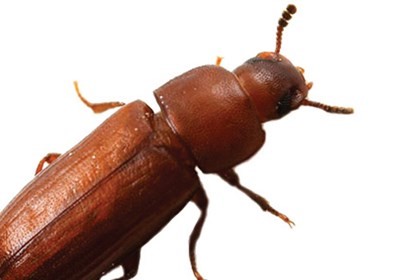When you’re ready to hit the kitchen to whip up some of your favorite baked goods for the holiday season, the last thing you want to discover is a cupboard full of bugs!
Unfortunately, there are several species of insects that wreak havoc in homes, grocery stores, and food processing plants all over Wisconsin, breaking into and eating away at our stored dry foods. These are called “pantry pests,” a term encompassing many kinds of insects only related by their food preferences.
Those who have dealt with pantry pests know how difficult it can be to get rid of them entirely. To learn the best ways to prevent them from infesting your home to begin with, read on for advice from the Batzner Pest Control technicians!
Common Pantry Pests in Wisconsin
Learning more about the common types of pantry pests in Wisconsin will help you recognize the signs of an infestation early on. These are the most common pantry bugs in our area:
- Indian meal moth: These tiny moths love to eat and live in our stored flour, cereal, and cornmeal. They have a range of tan hues across the backs of their wings and produce yellowish larvae with pink heads.
- Cigarette beetle: At only 2 to 3 mm in length, these tiny beetles can be hard to catch. They have a dull brown color and are known to infest tobacco in addition to all sorts of dried food products.
- Drugstore beetle: These beetles are hard to tell apart from cigarette beetles, although they do have a slightly brighter coloration and thinner bodies. Drugstore beetles are sometimes called “bread beetles” for their love of infesting bread products.
- Weevil: Weevils are small brown insects with a distinctive snout. They commonly infest pantry products such as flour, pasta, rice, and nuts.
Some Tips for Preventing Pantry Pests
As is the case for avoiding many kinds of insects, the best pantry pest control starts with prevention. Working to stop infestations before they start will end up saving you time and money in the long run, as well as the hassle of pulling out your baking ingredients to find them teeming with pests. Here are some tips for keeping pantry pests out of your home:
- Inspect any food you purchase at the grocery store to make sure the packaging isn’t damaged.
- Don’t leave any food out in the open for too long.
- Keep your food stored and sealed in airtight containers.
- Keep your pantry closed as much as possible.
- Check around your home to make sure that your door and window screens are intact.
- Seal off any gaps or cracks that could provide pests entry points into your home.
- Make sure to label your containers with the date you sealed it.
- Discard expired foods
- Buy smaller quantities of food so that you use them up faster than pests can find them.
- Keep your kitchen compost sealed.
- If you recently had pantry pests, be sure to check all of your stored food to make sure that nothing is contaminated.
Removing Pantry Moths and Larvae
The real troublemakers aren’t the adult moths you see, it’s their tiny larvae that do the damage. These moth larvae love to feast on grains, cereals, flour, nuts, dried fruit, and even pet food.
- The first step in removing pantry moths is to empty your entire pantry. Throw away any infested items in sealed garbage bags and take them outside immediately.
- Next clean every crack, crevice, and shelf thoroughly.
- Once everything is clean and dry, use traps to catch any remaining meal moths.
- Store all your new pantry items in airtight glass or heavy plastic containers to prevent future infestations.
And if you’ve tried these steps and still see moths and larvae returning, it’s time to call in the professionals.
Call Us for Professional Pantry Pest Control
If you feel that you’re at the end of your rope trying to get pests out of your pantry, talk to your local pest control company about your problems. At Batzner Pest Control, we have seen every kind of pantry pest living in Wisconsin. We can safely remove them from your home and identify the reasons for their appearance, helping you avoid them in the future.
Contact us today for a free quote!

